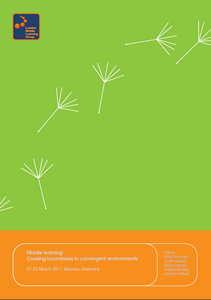Today in the afternoon we published the book of abstracts of the ‚Mobile learning: Crossing boundaries in convergent environments‘ Conference. The file is available as download from the LMLG website.
The BOA is edited by Klaus Rummler, Judith Seipold, Eileen Lübcke, Norbert Pachler and Graham Attwell and runs under the ISSN No. 1753-3385

Table of contents:
9 editorial 15 about the London Mobile Learning Group 19 section 1 – theoretical inputs on mobile learning 21 Providing scaffolding by using mobile applications in connectivist learning environment; 27 It’s not what you know but the device you know: The influence of ownership on appropriation of mobile devices for learning on field trips; 31 A critical perspective on mobile learning: Results of a heuristic analysis of the scientific process and a hermeneutic analysis of mobile learning practice; 35 Longitudinal, educational design research investigation of the temporal nature of learning: Taking a Vygotskian approach; 39 A design toolkit for next generation mobile learning; 43 „Recombinant Fiction“ theoretical paper and manifesto; 51 Learning in liminal spaces; 53 Creation and curatorship in new media; 57 Using theory to drive the design and re-design of mixed reality visualisation systems 61 section 2 – practical issues to support mobile learning 63 ConEx – mobile collaborative learning environment for conferences; 69 L3T assists m-Learning; 73 Workshop: Mobile Learning in School; 77 Just because they own them, doesn’t mean they use them: Exploring the potential for mobile learning in Higher Education; 81 It’s not a netbook – it’s a lifestyle! How could mobile technologies be used didactically to bridge formal and informal learning?; 85 Lerninfrastrukturen für mobiles Lernen: Rahmenbedingungen bei der Einführung mobiler Lerntechnologien; 89 Using mobile 360 degree performance feedback tools in Health and Social Care practice placement settings: An evaluation from the students’ perspective.; 93 MoLeaP – the mobile learning project database; 97 mobileTUD – der lange Weg zum „mobilen Ruhm“; 103 Learning, mobiles & development; 107 Technology narratives and mobile spatial learning; 111 An invitation to a joint post-assignment reflection – using podcasts as media for offering reflective space within vocational teacher education; 115 Augmented reality as a tool for mobile learning and a method for scholarly dissemination; 119 How should mobile learning be evaluated?; ; 123 M-project: first Steps to applying action research in designing a mobile learning course in higher education; 133 Exploring the order of precedence when using contextual dimensions for mobile information delivery; 137 Mobile lerngemeinschaften: beispiele, erfolgsfaktoren und stolpersteine 143 section 3 – concrete pointers and examples on mobile learning 145 Towards contextualized annotations to improve learning in museum; 149 Use of mobile learning by physician trainees in Botswana; 151 The potential of smartphones to mediate intra-hospital communication and learning practices of doctors. Preliminary results from a scenario-based study.; 157 Supporting learning on building sites with mobile technologies; 161 otu.lea – potenziale einer online-testumgebung für funktionale analphabetInnen und mobile learning; 167 Mobile learning in der lehrveranstaltung „industrielles projektmanagement“ – Unterstützung selbstorganisierter und kollaborativer lernprozesse durch iPods; 171 Personalized mobile learning for people with special needs; 175 The use of iPhones in medical education; 179 Near and far contemplating (NFC) the future trends in mobile and what’s happening right here right now; 183 Offline mobile learning with Copyleft hardware; 187 The case for audio in mobile learning; 191 Providing training handouts for corporate learning as ePUB files for mobile devices and e-reader; 195 Mobile learning isn’t one flavour or one approach it’s a whole grocery store; 199 Using mobile devices to support careers advice, information and guidance
And thanks a lot to Manos Agianniotakis for doing a great design work ;-)